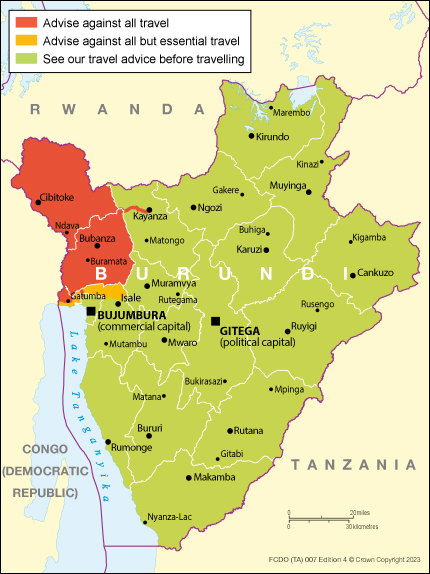Burundi
Summary

For security reasons, the Foreign, Commonwealth & Development Office (FCDO) advises against all travel to:
- Cibitoke and Bubanza provinces
- areas of Bujumbura Rural province west of the Rusizi river towards the Democratic Republic of Congo border, with the exception of the Rusizi Delta Nature Reserve
- the road north of Bujumbura airport towards Cibitoke
- the main road running west from Kayanza through the Kibira National Park
The FCDO advises against all but essential travel to:
- Rusizi Delta Nature Reserve
- Bujumbura rural, above the Isale road
Before you travel, check the ‘Entry requirements’ section for Burundi’s current entry restrictions and requirements. Due to COVID-19, these may change with little warning. Monitor this advice for the latest updates and stay in contact with your travel provider.
If you plan to pass through another country on your journey, check the travel advice for the country you’re transiting.
It is more important than ever to get travel insurance and check it provides appropriate cover. See the FCDO’s guidance on foreign travel insurance.
Overnight on 2 September, armed rebels attacked the northern part of Bujumbura International airport. Two civilians were killed during the exchange of fire. The Red-TABARA group has claimed responsibility for the attack.
The security situation near the border with the Democratic Republic of Congo (DRC) and Rwanda remains unstable, and there have been armed attacks. If you’re travelling near the border with DRC or Rwanda, you should exercise caution and keep up to date with developments on the current situation, including via local media and this travel advice. See Local travel
Since April 2022, Burundi has been facing the first ever Rift Valley Fever (RVF) outbreak in the country, a disease which primarily affects livestock. In response, the government has prohibited the slaughter of cattle, goats and sheep. To date, there are no report of humans contracting the disease in Burundi, though human infection remains a possibility, through mosquito bites or for people in direct contact with infected animals. See Health
Burundi is currently suffering from severe fuel shortages across the country. You shouldn’t take accessibility of fuel for travel in the country for granted. Where fuel is available, there can often be long queues. See Road travel
There are limited facilities up country with little French spoken, and limited infrastructure. Make sure you’re as well prepared and self-sufficient as possible. See Road travel
The British Embassy Office in Bujumbura can offer limited consular assistance to British nationals in Burundi. The British High Commission in Kigali, Rwanda, can provide additional consular support to British nationals in Burundi. See Consular assistance
There’s a high risk of street crime. There have been incidents of armed burglary, sometimes targeting foreign exchange offices and banks. See Crime
Terrorist attacks in Burundi can’t be ruled out. Al Shabaab has made public threats against Burundi because of its support to the African Union peacekeeping mission in Somalia. See Terrorism.
A long running cholera epidemic in Burundi (including Bujumbura) has caused several fatalities. You should take necessary precautions and seek urgent medical attention if you become unwell. See Health
Visitors should be aware of confirmed cases in October of Ebola in Beni, North Kivu province in eastern Democratic Republic of Congo (DRC), in the same province as a previous outbreak. No cases have been reported in Burundi. See Health